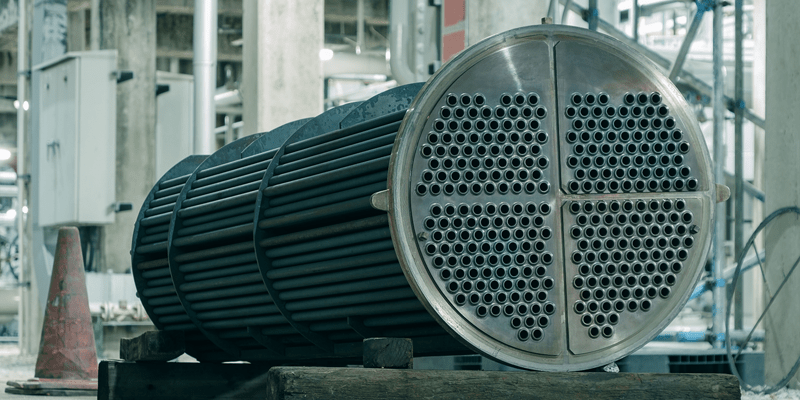
If you own any type of property, there is a good chance you are familiar with furnaces. However, many people are surprised to learn there are many different types of systems that can be used to heat or cool an indoor space. While furnaces are some of the most commonly used for both residential and commercial settings, heat exchangers are also widely used. So what are the key differences between heat exchangers and furnaces, and when is it best to use one over the other? This article will explore the differences between heat exchangers and furnaces, how to determine which is best for your home, and the importance of hiring a professional.
Furnaces
A furnace works by heating air in an enclosed space. This heated air then moves into ductwork that distributes that air evenly throughout the room or structure. There are several important components in these types of units, including the heat exchanger, fan, and blower.
Each of these components has an individualized function to keep the unit running smoothly and provide you with consistent comfort. For example, the heat exchanger is what actually heats up while the fan sends air through that unit. The blower is responsible for moving heated air throughout your home via the ductwork system.
If you are looking to use a furnace in your home or business, one of the most important things to consider is who will install it. While furnaces can provide great heating options for residential and commercial properties, they need to be installed properly to operate efficiently and safely for years to come.
As such, hiring a professional contractor is vital when considering installing these types of units on any property. They will have the tools needed to ensure your furnace is correctly sized for your space and installed so that it provides adequate airflow throughout the room at all times.
Heat Exchangers
A heat exchanger is similar to a furnace in some ways because it works to heat a room or other space. However, unlike a furnace, it does not rely on fan propulsion to send heated air throughout your home. As such, heat exchangers can offer more targeted heating in an enclosed area. This makes them ideal for specific spaces like bathrooms and bedrooms.
As you might imagine, several key differences between a heat exchanger and a furnace must be taken into account when determining which is best for your needs. For example, if you have a larger home or even just an open floor plan that features several different rooms with multiple occupants, then a furnace might be better since the air will stay evenly distributed throughout the property at all times.
However, if certain areas in your home or business would benefit more from targeted heating, like certain rooms or open spaces, then a heat exchanger may be the way to go. No matter what, when making this type of a decision, you must take lots of things into account, including your budget and any additional installation costs.
Differences Between Heat Exchangers and Furnaces
Deciding between heat exchangers and furnaces can be very confusing given that they both utilize different types of systems for heating air in an indoor space. However, there are several key differences between heat exchangers and furnaces that you should keep in mind when determining which is best for your needs. These include:
Heat exchangers work by transferring energy rather than generating it themselves, while furnaces are fueled by electricity, gas, or oil.
Heat exchangers are generally more efficient since they do not require a fan to distribute air throughout your home; furnaces may be less efficient depending on the size of the unit and the layout of your home.
Heat exchangers can provide targeted heating for specific rooms or open spaces, making them ideal for smaller homes or areas with only one occupant; furnaces will generally work well in larger homes or properties with multiple occupants.
Since heat exchangers do not rely on ventilation fans to distribute hot air throughout your home, they are more common in older structures that don’t feature forced airflow systems. On the other hand, furnace installation is more common in newer construction where forced airflow is available.
If you live in a colder climate, it is generally recommended that you install a heat exchanger for your home or business; if you live in a warmer climate, then a furnace may be just fine.
No matter which type of unit you install for your home or property, it is important to remember that there are vital differences between heat exchangers and furnaces. By understanding these differences before buying either one, you can make an informed decision based on the needs of your family and the layout of your property.
Be Sure to Hire a Professional for Installations or Repairs
If you are unsure which type of unit is best for your property or need help finding the right parts and services for your existing unit, be sure to hire a professional HVAC company to take care of any issues that may arise. Whether you’re looking for repairs or new installations, hiring pros will ensure that work is done correctly at all times. You don’t want to risk accidental injuries or damage to your new heating system with a DIY installation. Let the professionals handle any repairs or maintenance that your system needs.
Do You Need Installation? Call our Team of Experts Today
If you need help installing or repairing your heat exchanger or furnace, be sure to contact us now. We provide top-notch service to make every installation as efficient as possible, so don’t hesitate to reach out to our team now! You can also check out our site for more information about what we do and how we go above and beyond for customers like you. We are happy to provide free estimates on all our services and are available any time.
